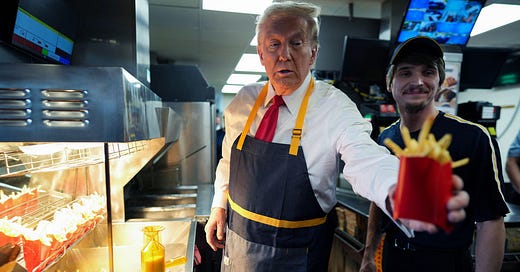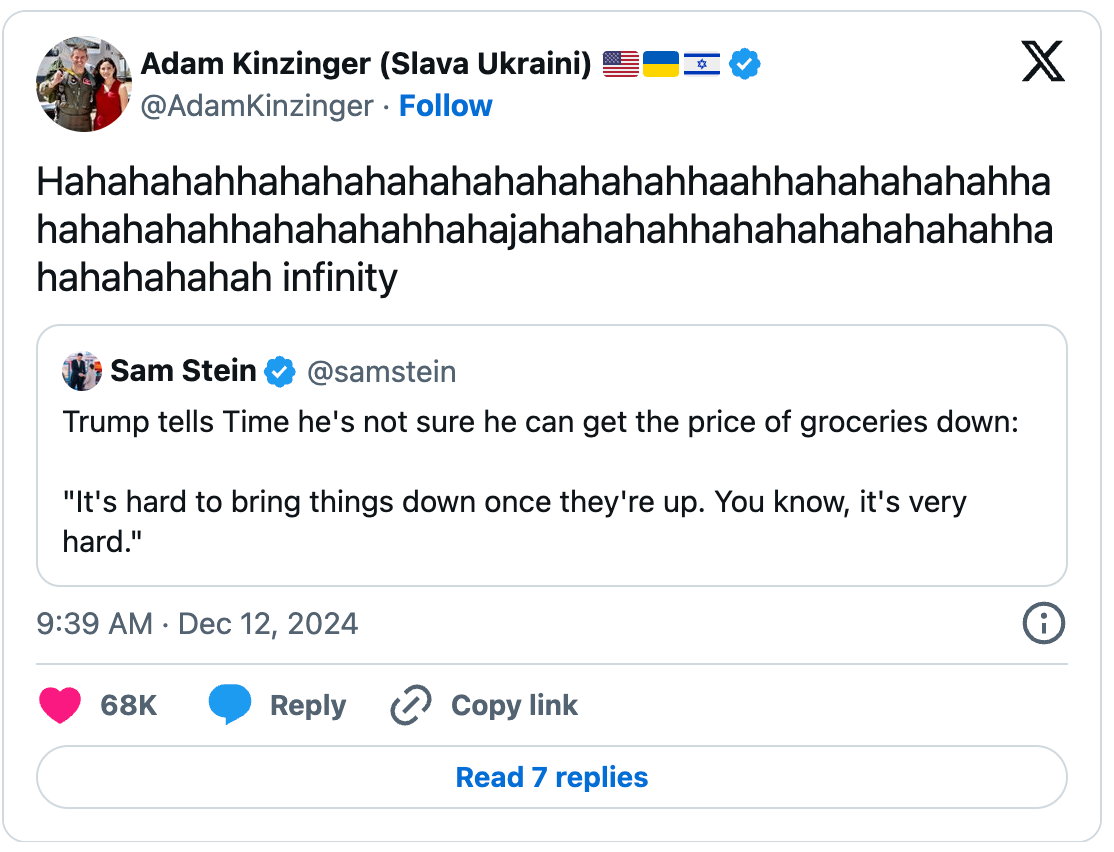Do you remember when candidate Donald Trump said, “Grocery prices have skyrocketed. How can a family afford that? So, when I win, I will immediately bring prices down.” That was at a rally in August.
Or how about this: “We will end inflation and make America affordable again, and we’re going to get the prices down, we have to get them down.” He made that pledge in September.
The day before the election, he promised that “a vote for Trump means your groceries will be cheaper.” He said that while standing at a podium emblazoned with the words, TRUMP WILL FIX IT.
Are you sensing a trend?
Trump clearly knows how to appeal to the electorate. He understood that high inflation and the promise to bring prices down were the most important issues facing Americans. He exploited the fear of economic uncertainty to win. Of the 70% of voters who said they were “very concerned” about prices, 6 in 10 cast their ballot for Trump.
On December 8, Trump crowed about it on NBC’s “Meet the Press.” “I won on groceries. A very simple word, ‘groceries.’”
Four days later, he backpedaled.
“Look, they got them up. I’d like to bring them down,” he told Time magazine. “It’s hard to bring things down once they’re up. You know, it’s very hard.”
So let’s get this straight. The president-elect is reneging on promises six weeks before he takes office.
Former Republican Congressman Adam Kinzinger brought some levity to an otherwise hard-to-swallow reality.
Trump isn’t wrong about it being “hard.” Curbing inflation, slowing the rate of price increases, is difficult enough. But Trump is talking about deflation, actual price drops. Those usually happen only during an economic downturn like a recession or a depression. Trust me, we don’t want either.
So it looks like all those people who voted for him, despite all the reasons not to, will be abandoned on aisle 6, in the hoodwink section. Because not only will Trump be unable to bring prices down from the day he “takes the oath of office,” most economists say his proposed policies, like imposing tariffs and deporting undocumented workers, would actually drive prices up — way up.
Trump, an Ivy League-educated, trust-fund billionaire, is an unlikely populist. A member of the 0.1% who has likely never been grocery shopping figured out how to appeal to Americans at the bottom of the economic ladder, with, it turns out, empty promises.
That bottom rung is getting larger. The wealth inequality in our country is astounding and worsening. In 1970, 61% of the U.S. population was considered middle class. It’s now down to 50% and shrinking. Today, the top 1% of Americans hold 31% of the wealth; the bottom half holds just 2.6%. We all might want to pause to fully consider those percentages.
Then there is this: According to the U.S. census the median household income in the United States was just over $80,000 a year in 2023. Half of all Americans earn less than that. No wonder the price of eggs, which has soared 37.5% in part because of an avian flu outbreak, is a big problem. Grocery prices have risen 28% in five years, according to the USDA. That is a stunning increase. Besides bird flu, supply-chain disruption and pent-up demand from the pandemic are among the problems. So is the war in Ukraine. Ukraine is normally a major grain supplier to the U.S.
Another factor is “greedflation.” Corporate profits have increased by 29% since the start of the pandemic; grocery prices have risen by almost the same percentage. According to the Groundwork Collaborative, this increase accounts for a large portion of the higher prices we are all paying. By their assessment, as much as 53 cents of every dollar spent can be attributed to corporate profit-taking.
Corporations are entitled to make profits, of course. Indeed, in our economic system we need them to be profitable. But how much is too much — especially considering the astronomical salaries of many corporate executives? According to the Economic Policy Institute, over the past 45 years, top CEO compensation increased by 1,085% (not a typo) while their typical worker’s salary inched up by just 24%.
Bending the truth and overpromising on the campaign trail are as American as cherry pie. Basing a campaign on something you know you can’t make happen is a low reserved only for Trump. It will be worth watching what happens during the 2026 midterm elections if prices continue to rise on the most basic of necessities. Control of Congress could again hinge upon the price of eggs.
To support my team’s efforts to protect our democracy through the power of independent journalism, please consider joining as a paid subscriber. It keeps Steady sustainable and accessible for all. Thank you.
No matter how you subscribe, I thank you for reading.
Stay Steady,
Dan





A week after the election I was talking to a long time friend, business owner and devout Christian. She made a comment, saying that "now things have settled down, prices will start dropping, thank God." I asked her to repeat that because I wasn't sure I'd heard her correctly. When she repeated herself, I said "Well, I'm 65 years old, and been around for awhile! I've never in my life seen the price of anything go down, except gasoline since it fluctuates." She insisted it would happen. A college educated, experienced, profitable business owner. Her husband, who was standing there, said "Honey, the prices of things don't ever go down." She became angry and insistent. I interrupted her and said I needed to go. We haven't spoken since. And this is the part I don't get. How could intelligent, kind people believe something so patently ridiculous?
Of course he was lying. What is Trump good at? Excellent at? Marketing himself. He knows exactly what to say to get people to vote for him. Doesn't have to be true, it doesn't matter. He says it and repeats it, and soon it's the truth. The media hasn't helped. Every time Biden tripped it was front page news for days. Every time Trump tripped (mostly over his mouth) there was ....radio silence. And look where we are.